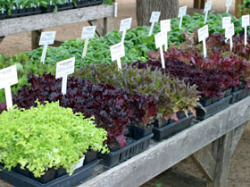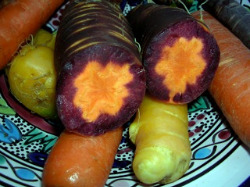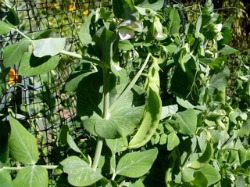
Lettuce is a widely adapted winter vegetable in most zone 7, 8, and 9 climates. It grows and can be harvested all winter.
You can garden through the winter in almost any climate. Even northern gardeners can enjoy harvests of root crops and greens in the winter if they are willing to put in the effort to protect plants with cloches, cold frames, or hoop houses. However, gardeners in mild winter areas, such as coastal California, Oregon and Washington; Arizona; Texas and Florida, can really bask in fall and winter's glory. While gardeners in cool summer areas, such as coastal Northern California, Oregon and Washington, look to extend and protect fall planted veggies through the damp, cool weather of winter, gardeners in southern Arizona, the Gulf Coast, Texas, and Florida are loving the cool temperatures to sow and grow a variety of vegetables that don't survive the heat of summer. In some areas, such as southern Florida and Texas, they are even growing warm season crops of tomatoes in winter, but that's a topic for another article.
In this article, I'd like to focus on the crops and techniques you can use to grow a winter garden in hardiness zones 7, 8, and 9. If you're gardening in a colder climate, check out these stories I wrote on a Fall Greens Garden and Season Extenders to enjoy fresh produce in your garden this winter. In the mild winter areas, temperatures rarely get much below freezing for very long in winter, although sometimes temperatures can dip into the teens. There's still time to plant many cool weather loving crops in most of these regions.
Why Plant a Winter Garden?There are many reasons to plant a winter garden in these areas. Often, it's the only time to really be able to get cool season crops such as broccoli, spinach, lettuce, and carrots to grow properly. Plus, there's less work involved.
October is a great time to plant in these mild areas because the heat of summer has passed, but the soil is still warm. The days are shorter, the sun's intensity less, and there are fewer insects and diseases around to attack your plants. This allows cool weather seedlings and transplants the luxury of growing slow and strong to maturity. For the gardener, there's less weeding, watering and care involved and more comfortable weather to work in. Weeds will germinate, but they will not grow strongly during the short days and are easy to remove. Moisture holds in the soil longer in fall so the garden requires less watering. There's time to harvest plants as needed, knowing they will hold in the garden longer than if growing under high heat conditions.
Preparing the Winter GardenStart your winter garden by turning the soil, removing perennial weeds and grasses, and amending it with compost. While winter rains are welcome in most mild winter areas, in cool damp winter areas such as Seattle, cool rains can mean plants rotting. Consider growing plants in raised beds. This will keep the soil well drained and help avoid water logging. Amend the soil before planting and add an organic fertilizer at or just after planting time. That's usually enough to carry your plants through the winter.
What to Plant?
Colorful carrot varieties can be sown in fall in zones 8 and 9 for a winter harvest. Choose varieties adapted to winter growing.

Peas make a great fall crop. Snow peas are easier to grow than English peas because you don't have to wait for them to fill out to eat.
Winter is cool season crop time. Greens, such as arugula, spinach, collards, lettuce, Swiss chard, mustard and kale, thrive. Root crops, such as carrots, beets, onions and radishes, grow well. Brassicas, such as broccoli, cauliflower and cabbage, form large heads. Legumes, such as fava beans and peas, grow and flourish. All these cool loving vegetables have better flavor and texture than if you tried to grow them during the heat of spring or summer.
Which crops to grow and the timing of planting in your specific area will depend on your location. In zone 7 gardens and the Pacific Northwest, greens are probably the best bet for an October planting. In zones 8 and 9, you have a broad palette of cool season crop options. Look for varieties adapted to your region and for winter planting (check out the resources listed at the end of this article). For example, 'Winter Keeper' beet, January King' cabbage and 'Royal Chantenay' carrots are some varieties adapted to winter growing conditions.
Garden MaintenanceIn most of these areas winter means regular rainfall, so watering is usually not an issue. Unless you're in the Pacific Northwest, it's still a good idea to mulch your plantings to preserve the soil moisture and keep the weeds away. In the Pacific Northwest, the abundant winter rains combined with consistently cool temperatures can lead to rot, slugs and snails. Mulching just makes it worse.
While most pests are not active in winter, cabbage worms and slugs are two that never seem to rest. Watch for cabbageworm droppings on your Brassica plants and spray Bt to control them at the first sign of their activity. Slugs and snails are a particular problem in cool areas. Protect raised beds with copper flashing. Slugs and snails don't like touching copper. Add iron phosphate baits, such as Sluggo, around plants. Consider covering plants with a floating row cover tucked tightly into the soil to prevent the snails and slugs from entering the bed. Row covers have another benefit.
For gardeners concerned about freezing temperatures, the row cover can protect plants into the low 20 degrees F, while allowing light, rain and air to the plants
Harvest crops as needed. While many vegetables are picked and finished, such as cabbage, cauliflower, carrots and beets, some keep producing in winter. Many greens, such has spinach, lettuce and mesclun mix, can be cut a number of times to the ground and allowed to regrow in winter. As long as the temperatures stay cool, they will not bolt. Broccoli heads will continue to send out side shoots, and peas and fava beans will continue to flower and fruit. Even if they go into a holding pattern during December and January, they will quickly start growing and producing again when the longer days arrive in February.
So with some planning and proper maintenance you can enjoy a winter garden that provides fresh produce to your family right through the dark days until spring.
Other Stories on Winter Gardening in Warmer Climates:A Winter Vegetable Garden (Southern California)
When to Plant Vegetables in USDA zones 8-11
Salad Season (Texas)
Planting Cool Season Vegetable Beds (Arizona)
Florida Garden Guide
 Charlie Nardozzi is an award winning, nationally recognized garden writer, speaker, radio, and television personality. He has worked for more than 30 years bringing expert gardening information to home gardeners through radio, television, talks, tours, on-line, and the printed page. Charlie delights in making gardening information simple, easy, fun and accessible to everyone. He's the author of 6 books, has three radio shows in New England and a TV show. He leads Garden Tours around the world and consults with organizations and companies about gardening programs. See more about him at Gardening With Charlie.
Charlie Nardozzi is an award winning, nationally recognized garden writer, speaker, radio, and television personality. He has worked for more than 30 years bringing expert gardening information to home gardeners through radio, television, talks, tours, on-line, and the printed page. Charlie delights in making gardening information simple, easy, fun and accessible to everyone. He's the author of 6 books, has three radio shows in New England and a TV show. He leads Garden Tours around the world and consults with organizations and companies about gardening programs. See more about him at Gardening With Charlie.
 Victory Seed Company has all the seeds you want for your best garden in 2024.
Victory Seed Company has all the seeds you want for your best garden in 2024.
For 25 years, the family-owned Victory Seed Company has provided the highest quality vegetable, herb and flower seeds to families across the country. We are passionate about providing you the best seeds available that give excellent germination, robust plants, and the harvest you want. With a catalog of over a thousand varieties, we have everything, and our prices are the kinds that we'd want to pay. We have hundreds of yesterday's heirloom vegetables, as well as today's award winning hybrid selections. Get to know us by visiting our website and browsing through our online vegetable seed catalog.